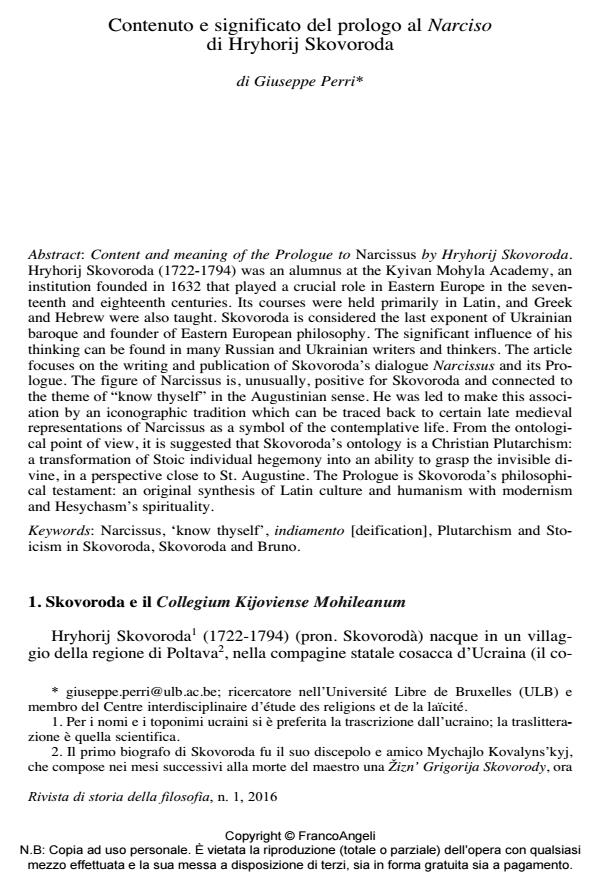Contenuto e significato del prologo al Narciso di Hryhorij Skovoroda
Titolo Rivista RIVISTA DI STORIA DELLA FILOSOFIA
Autori/Curatori Giuseppe Perri
Anno di pubblicazione 2016 Fascicolo 2016/1
Lingua Italiano Numero pagine 22 P. 25-46 Dimensione file 559 KB
DOI 10.3280/SF2016-001002
Il DOI è il codice a barre della proprietà intellettuale: per saperne di più
clicca qui
Qui sotto puoi vedere in anteprima la prima pagina di questo articolo.
Se questo articolo ti interessa, lo puoi acquistare (e scaricare in formato pdf) seguendo le facili indicazioni per acquistare il download credit. Acquista Download Credits per scaricare questo Articolo in formato PDF

FrancoAngeli è membro della Publishers International Linking Association, Inc (PILA), associazione indipendente e non profit per facilitare (attraverso i servizi tecnologici implementati da CrossRef.org) l’accesso degli studiosi ai contenuti digitali nelle pubblicazioni professionali e scientifiche.
Hryhorij Skovoroda (1722-1794) was an alumnus at the Kyivan Mohyla Academy, an institution founded in 1632 that played a crucial role in Eastern Europe in the seventeenth and eighteenth centuries. Its courses were held primarily in Latin, and Greek and Hebrew were also taught. Skovoroda is considered the last exponent of Ukrainian baroque and founder of Eastern European philosophy. The significant influence of his thinking can be found in many Russian and Ukrainian writers and thinkers. The article focuses on the writing and publication of Skovoroda’s dialogue Narcissus and its Prologue. The figure of Narcissus is, unusually, positive for Skovoroda and connected to the theme of "know thyself" in the Augustinian sense. He was led to make this association by an iconographic tradition which can be traced back to certain late medieval representations of Narcissus as a symbol of the contemplative life. From the ontological point of view, it is suggested that Skovoroda’s ontology is a Christian Plutarchism: a transformation of Stoic individual hegemony into an ability to grasp the invisible divine, in a perspective close to St. Augustine. The Prologue is Skovoroda’s philosophical testament: an original synthesis of Latin culture and humanism with modernism and Hesychasm’s spirituality.
Parole chiave:Narcissus, ‘know thyself’, indiamento [deification], Plutarchism and Stoicism in Skovoroda, Skovoroda and Bruno
- The Evolution of Gregory Skovoroda’s Philosophical Views as related to his Spiritual Biography Victor Chernyshov, in Sententiae /2018 pp.65
DOI: 10.22240/sent37.01.065
Giuseppe Perri, Contenuto e significato del prologo al Narciso di Hryhorij Skovoroda in "RIVISTA DI STORIA DELLA FILOSOFIA" 1/2016, pp 25-46, DOI: 10.3280/SF2016-001002